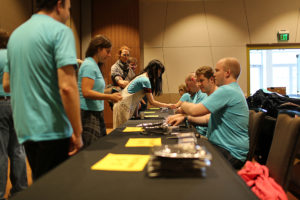7 Features of C++17 that will simplify your code--fenbf
C++17 is almost there.
7 Features of C++17 that will simplify your code
by fenbf
From the article:
With each C++ standard, we aim for simpler, cleaner and more expressive way to code. C++17 offers several "big" language features that should make our code nicer. Today, I tried to pick seven things that make your code more compact right off the bat.

 Have you registered for CppCon 2017 in September?
Have you registered for CppCon 2017 in September?  An amazing opportunity!
An amazing opportunity! Have you registered for CppCon 2017 in September?
Have you registered for CppCon 2017 in September?